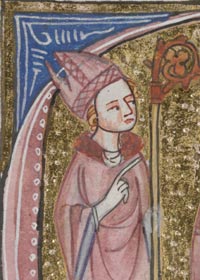 |
 |
 |
 |
 |
 |
 |
|
Byland Abbey: History
Byland Abbey: Buildings
|
Heard at Byland: Wimundís Woes Such things ought not to be passed over in silence,
that posterity may learn how He who resisteth the proud, but giveth
grace to the humble was illustrated by this individual. The Yorkshire Augustinian, William of Newburgh, relates the colourful story of Wimund, an elderly and blind monk of Byland, whom William had often seen at the abbey and heard of his ‘most audacious acts as well as his merited misfortunes.’(2) William includes an account of the man and his adventures in his history of English affairs. This reveals that Wimund was of lowly birth. However, his ability to write led him to seek employment with the Savigniacs of Furness, where he later became a monk. Wimund’s ‘ardent temper’ his ‘retentive memory’ and ‘competent eloquence’ ensured his swift progress in the monastic life and he was amongst those sent to found a new community on the Isle of Man. Here, the sweetness of his address, the ‘openness of his countenance’ and his ‘tall and athletic build’ won for him the acclaim of the people of Man, who appointed Wimund as their bishop. Wimund sought greater acclaim and was hungry for even more power. Accordingly, he gathered together a band of supporters and convinced them that he was the rightful heir to the earldom of Mowbray, who had been deprived of his inheritance by the king of the Scots. Determined to help Wimund reclaim his birthright, the men pledged their fidelity and joined his crusade against the king of the Scots. Thus, as William of Newburgh remarks, this fisher of men turned hunter of men. Wimund evidently cut an impressive figure. Standing head and shoulders above his men, ‘wasting all before him with rapine and slaughter’, he successfully ravaged the Scots. However, Wimund’s reign of terror was checked when one bishop resisted his demands for tribute and, through God’s assistance, drove the warlord away. Reminiscent of David and Goliath, the bishop hurled a hatchet at Wimund, driving him away to Scotland. The king of the Scots granted Furness and a province to Wimund, ostensibly to placate the rebel but in actuality to provide him with a false sense of security. This had the desired effect. Wimund paraded around the area with his army, inciting those who had known him previously as a monk to set a trap to capture, blind and castrate this adventurer ‘for the sake of the kingdom of Scotland, not for that of Heaven’. Following his downfall, Wimund retired to Byland where he remained humiliated, but unrepentant, until his death. There, the ‘pretended monk and bishop’, told his woes to those who would listen and maintained that had he even the eye of a sparrow, ‘his enemies should have little occasion to rejoice at what they had done to him.’ (3)
|
